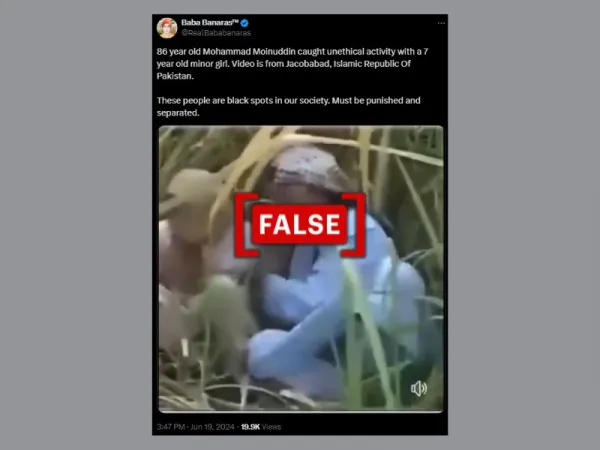By: Chandan Borgohain
June 21 2024
 Social media posts have falsely shared a scene from an Iranian TV show as a Muslim man sexually abusing a minor girl. (Source: X/Screenshot)
Social media posts have falsely shared a scene from an Iranian TV show as a Muslim man sexually abusing a minor girl. (Source: X/Screenshot)
The video is from the 2004 Iranian TV series 'Zahra's Blue Eyes.' It is not connected to Pakistan and does not portray any form of sexual violence.
What is the claim?
A short video clip showing an aged man and a young girl in a crop field has been spreading rapidly on social media with the false claim that it depicts a Pakistani Muslim man engaging in an "unethical activity" with a minor girl.
The clip was shared on X (formerly Twitter) by Baba Banaras, a known spreader of misinformation, who wrote, "86-year-old Mohammad Moinuddin caught unethical activity with a 7-year-old minor girl. Video is from Jacobabad, Islamic Republic of Pakistan. These people are black spots in our society. Must be punished and separated." Archived versions of this and other such posts can be accessed here, here, and here.
Screenshots of social media posts sharing the viral video. (Source: X/Screenshot)
However, this claim is inaccurate. The viral clip actually depicts a scene from a Syrian-Iranian television series dating back to 2004.
What did we find?
Upon conducting a reverse image search of a keyframe from the video, we identified a YouTube video titled "Zəhranın mavi gözləri" Filmi. Zahra's blue Eyes. Filistinli Zehra'nın Gözleri Filmi," dated May 22, 2022. The viral clip is visible around the 02:32:45 timestamp of this video (archived here).
Subsequent keyword searches confirmed that "Zahra's Blue Eyes" is indeed an Iranian TV drama series released in 2004.
What's happening in the scene?
A review of the film reveals that the sequence featured in the viral clip depicts young Zahra and her grandfather Rahman seeking refuge in a crop field to evade Israeli forces. Preceding this viral scene is a nighttime sequence where Zahra and Rahman cross a railway track and flee into the crop field while being pursued by a large group of armed men.
The clip then transitions to the now-viral moment: Rahman awakens to morning light with Zahra sleeping beside him in the open field. He gently rouses her, saying, “Zahra! Wake up, my dear. It looks like there’s a road here.” Importantly, this entire sequence does not portray child molestation, contrary to claims circulating on social media.
According to the Middle East Media Research Institute (MEMRI), a U.S.-based non-profit organization, the series, originally filmed in Persian and later dubbed into Arabic, centers on the theme of the “Israeli government stealing Palestinian children's eyes.” MEMRI TV has also hosted the series on its website, showcasing the same elderly man and young girl seen in the viral footage.
This definitively establishes that the viral scene originates from an Iranian TV series and has no connection to the alleged incidents involving a Pakistani man and a minor girl, as claimed by social media users.
The verdict